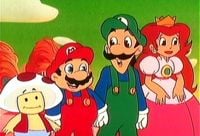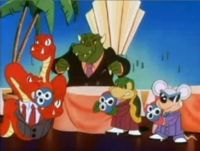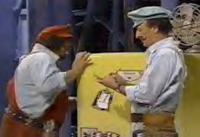The Super Mario Bros. Super Show!: Difference between revisions
m (It isn't " when it is a game it is ''.) |
Sir Grodus (talk | contribs) No edit summary |
||
| Line 54: | Line 54: | ||
On September 3, 1990 the show changed its name to '''Club Mario''', replacing the live-action Mario segment with two completely different characters known as [[Tommy Treehugger]] and Co-M.C., with occasional appearances by [[Tammy Treehugger]] (Tommy's twin sister) and [[Evil Eric]] (Co-M.C.'s evil twin brother). | On September 3, 1990 the show changed its name to '''Club Mario''', replacing the live-action Mario segment with two completely different characters known as [[Tommy Treehugger]] and Co-M.C., with occasional appearances by [[Tammy Treehugger]] (Tommy's twin sister) and [[Evil Eric]] (Co-M.C.'s evil twin brother). | ||
In another Mario related television series, ''[[King Koopa's Kool Kartoons]]'', framed portraits of ''The Super Mario Bros. Super Show!'' versions of Mario, Luigi, Toad and Princess Toadstool can be seen in various episodes. | |||
==Broadcast History== | ==Broadcast History== | ||
| Line 62: | Line 64: | ||
As of 2011, it can be watched via [[wikipedia:Netflix|Netflix]] and [[wikipedia:Hulu|Hulu]]. | As of 2011, it can be watched via [[wikipedia:Netflix|Netflix]] and [[wikipedia:Hulu|Hulu]]. | ||
When shown in reruns after cancellation, DiC took out all the song covers played during the chase scenes, and replaced them with instrumentals of songs featured in ''[[The Adventures of Super Mario Bros. 3]]'' and ''[[Super Mario World (cartoon)|Super Mario World]]''. This was probably done for licensing reasons as the lyrics of the song covers are copyrighted. | |||
From 1989 to 1991, Kid Klassics released NTSC VHS videos of the show. These videos contained two, one, or no live-action segments, and featured the cartoon segments as they originally aired (meaning they included the cover songs that were edited out in later airings). On these videos, the "Super Mario Bros." theme wasn't included before the cartoon segment. | |||
==Cast== | ==Cast== | ||
| Line 346: | Line 352: | ||
*In the first three episodes, Toad's color scheme was inverted. He sported a red cap with white spots, a white vest and red pants. This was fixed from the fourth episode onwards with a white cap with red spots, a red vest and white pants, although it was reused for Toad's "[[Super Toad]]" form in a [[The Fire of Hercufleas|later episode]]. | *In the first three episodes, Toad's color scheme was inverted. He sported a red cap with white spots, a white vest and red pants. This was fixed from the fourth episode onwards with a white cap with red spots, a red vest and white pants, although it was reused for Toad's "[[Super Toad]]" form in a [[The Fire of Hercufleas|later episode]]. | ||
*[[Trouter]]s were portrayed as being far more vicious than they were in ''Super Mario Bros. 2'', and would pursue anybody who came near them as if they were piranhas. their appearance more closely resembles that of [[Cheep-Cheep]]s than the Trouters seen in the game. | *[[Trouter]]s were portrayed as being far more vicious than they were in ''Super Mario Bros. 2'', and would pursue anybody who came near them as if they were piranhas. their appearance more closely resembles that of [[Cheep-Cheep]]s than the Trouters seen in the game. | ||
==Quotes== | ==Quotes== | ||
| Line 352: | Line 357: | ||
==Trivia== | ==Trivia== | ||
*Luigi's personality of being scared and cautious was first used in ''The Super Mario Bros. Super Show!''. Later, this personality appeared in video games most notably in the [[Mario & Luigi (series)|''Mario & Luigi'' series]], ''[[Luigi's Mansion]]'', ''[[Super Mario Galaxy]]'', and ''[[Luigi's Mansion: Dark Moon]]''. | *Luigi's personality of being scared and cautious was first used in ''The Super Mario Bros. Super Show!''. Later, this personality appeared in video games most notably in the [[Mario & Luigi (series)|''Mario & Luigi'' series]], ''[[Luigi's Mansion]]'', ''[[Super Mario Galaxy]]'', and ''[[Luigi's Mansion: Dark Moon]]''. | ||
==Gallery== | ==Gallery== | ||
Revision as of 12:29, July 25, 2013
Template:TV-infobox The Super Mario Bros. Super Show! was the first animated series based on the Super Mario series of videogames to be produced by DIC Entertainment, and the only one to be produced directly for syndication.
Each episode began with a live-action segment (all of which took place before the brothers discovered the Mushroom Kingdom.) starring Mario (portrayed by World Wrestling Federation star Lou Albano) and Luigi (Danny Wells) living in Brooklyn, where they would often be visited by a celebrity guest star at Mario Brothers Plumbing; a basement workshop which doubled as their home.
The live-action segment would be followed by a cartoon based on the Super Mario Bros. and Super Mario Bros. 2 video games, where Mario, Luigi, Princess Toadstool, and Toad would battle against King Koopa (Bowser) throughout the many lands of Mushroom World, often in a movie or historical parody. Mouser, Tryclyde, Fryguy and a single, unnamed Koopa Troopa often worked closely with King Koopa, serving as his henchmen. Getting into the spirit of these parodies, King Koopa usually took on a varying alter ego. He had a different outfit for each one, and would take on a different alias to along with it. For example, in a riverboat-themed episode, King Koopa was "Captain Koopa", while in one of the western-themed episodes, he went by "Billy the Koopa". In many episodes, King Koopa's minions would often dress up in outfits as well, to go along with Koopa's themed costumes.
Wart, the main antagonist of the second game, was never in any of the episodes, yet most of his minions managed to appear as members of the Koopa Pack. Like most 1980s cartoons, King Koopa would prolong the series' run by escaping from his adversaries (which he did through the use of Magic Potion), despite the fact that they could easily catch him.
The basis of the storyline (introduced at the beginning of every animated episode) was that Mario and Luigi were working on a bathtub drain which unknowingly was a warp zone to the Mushroom Kingdom, and Mario and Luigi had literally gone down the drain and ended up in the Mushroom Kingdom, by sheer coincidence causing problems for King Koopa and rescuing Toad and Princess Toadstool. Now that they were rescued, the focus for the Mario Brothers was to return to Brooklyn, while stopping King Koopa's tyranny whenever they could. Lou Albano and Danny Wells also voiced Mario and Luigi for the animated segment. It was never revealed if their live action sequences were a prequel to the animated series; or if they successfully returned to Brooklyn and resumed their duties in the plumbing business.
Following the cartoon was the third portion of the episode, which continued the story that the live-action segment set up in the beginning. Towards the end, the second live-action segment was interrupted with scenes from that week's upcoming episode of The Legend of Zelda.
The Super Mario Bros. cartoon was shown on Mondays through Thursdays only. On Fridays, the show would air The Legend of Zelda cartoons based on the game of the same name.
On September 3, 1990 the show changed its name to Club Mario, replacing the live-action Mario segment with two completely different characters known as Tommy Treehugger and Co-M.C., with occasional appearances by Tammy Treehugger (Tommy's twin sister) and Evil Eric (Co-M.C.'s evil twin brother).
In another Mario related television series, King Koopa's Kool Kartoons, framed portraits of The Super Mario Bros. Super Show! versions of Mario, Luigi, Toad and Princess Toadstool can be seen in various episodes.
Broadcast History
The show lasted from 1989 to 1990, and was available to watch from Yahooligans! TV starting in March 2004, with a new episode usually uploaded every week. However, on December 24, 2005 it was taken down along with all DiC Entertainment cartoons.
As of November 3, 2009 it can be watched at Jaroo.com, a video-streaming website owned by Cookie Jar Group. The website routinely cycles through all fifty-two of the show's episodes, hosting five at any given time. Each Tuesday, the next episode in line is added, with the oldest being dropped.
As of 2011, it can be watched via Netflix and Hulu.
When shown in reruns after cancellation, DiC took out all the song covers played during the chase scenes, and replaced them with instrumentals of songs featured in The Adventures of Super Mario Bros. 3 and Super Mario World. This was probably done for licensing reasons as the lyrics of the song covers are copyrighted.
From 1989 to 1991, Kid Klassics released NTSC VHS videos of the show. These videos contained two, one, or no live-action segments, and featured the cartoon segments as they originally aired (meaning they included the cover songs that were edited out in later airings). On these videos, the "Super Mario Bros." theme wasn't included before the cartoon segment.
Cast
Regulars
- Lou Albano — Mario
- Danny Wells — Luigi
- Jeannie Elias — Princess Toadstool, Birdo, and Shy Guy
- John Stocker — Toad, Mouser, Koopa Troopa and Beezo
- Harvey Atkin — King Koopa, Tryclyde, and Sergeant Kooperman
- Robert Bockstael — (Additonal Voices)
- Dorian Joe Clark — (Additonal Voices)
- Rob Cowan — (Additonal Voices)
- Denise Pidgeon — (Additonal Voices)
- Paulina Gillis — (Additonal Voices)
- Greg Morton — (Additonal Voices)
- Joyce Gordon — (Additonal Voices)
- Greg Swanson — (Additonal Voices)
- Diane Fabian — (Additonal Voices)
- Marilyn Lightstone — (Additonal Voices)
- Marla Lukofsky — (Additonal Voices)
Guest Stars
- Nicole Eggert (herself)
- Danica McKellar (Patty)
- Karen Hartman (Patty's mother)
- Jim Ward (Patty's father)
- Sgt. Slaughter (himself)
- Joseph Griffo (small Mario)
- Lyle Alzado (himself)
- Eugene Liebowitz (Dr. Frankenstein)
- Craig Armstrong (Frankenstein's Monster)
- Larry Gelman (Dr. Sigmund Fruitcake)
- Jim Ward (Count Zoltan Dracula)
- Fred Travalena (Elvis Presley)
- Paul Elder (Alligator Dundee)
- Shabba-Doo (himself)
- Pam Matteson (Cher)
- Clare Carey (E.C.)
- David Horowitz (himself)
- Harry Blackstone Jr. (himself)
- Magic Johnson (himself)
- Pam Matteson (herself)
- Marty Allen (Imperial Poobah)
- Donna Douglas (Ellie Mae)
- Gary Schwartz (Dr. Toby)
- Patrick Dempsey (Plant Monster)
- Regina Williams (Susanna Ross)
- Phillip Clark (HAL 9001)
- Ed Metzger (Einstein)
- Vic Dunlop (Pietro)
- Nedra Volz (Angelica)
- Scott Nemes (Young McDonald)
- Rob Stone (himself)
- Kay Ballard (Madam AGoGo)
- Brian Bonsall (himself)
- Craig Armstrong (gorilla)
- Ed Metzger (George Washington, Ralph Washington)
- Gary Schwartz (Inspector Klean)
- Larry Gelman (Vincent Van Gook)
- Sonny Trinidad (Obi-Wan Cannoli)
- Norman Fell (Ted Bull)
- Howard Stevens (himself)
- Jim Lange (himself)
- Gary Owens (The Wonderfully Wacky Willy White)
- Martin C. Gardner (Mikhail S. Gorbachev)
- Melanie Chartoff (Tawny Tyler)
- Fred Travalena (Mr. Gibbel)
- Gary Schwartz (Doc Freud)
- Vicki Bakken (Liz)
- Nedra Volz (Mrs. Periwinkle)
- Courtney Gibbs (Luigi's girlfriend)
- Joe Bellan (Tommy Lasagna)
- Karen Hartman (Mrs. Gammliss)
- Vanna White (Roxanne)
- Rowdy Roddy Piper (himself)
- Kort Falkenberg (Nick)
- Cyndi Lauper (herself)
- Ernie Hudson (himself)
- Moon Zappa (Marilyn)
- Elvira (herself)
- Norman Fell (Fred Van Winkle)
- Willard E. Pugh (Little Robert)
- Paula Irvine (Mad Donna)
- Maurice LaMarche (Inspector Gadget)
- Elaine Kagan (The Old Psychic Lady with the Evil Eye Who Reads Fortunes and Knows Everything Before it Happens)
- Eve Plumb (Jodie)
Episodes
| Monday | Tuesday | Wednesday | Thursday | Friday (The Legend of Zelda) |
|---|---|---|---|---|
Lyrics
Plumber Rap Part 1 (Show Intro)
Hey paisanos! It's the Super Mario Brothers Super Show!
We're the Mario Brothers, and plumbing's our game
We're not like the others who get all the fame
If your sink is in trouble, you can call us on the double
We're faster than the others, you'll be hooked on the Brothers Unh!
H-hooked on the Brothers
Gimme gimme, gimme gimme
Yo, you're in for a treat, so hang on to your seat
Get ready for adventure and remarkable feats
You'll meet Koopas, the Troopas, the Princess, and the others
Hangin' with the plumbers, you'll be hooked on the brothers, to the brink!
Unh! Unh!
I say a h-h-h-h-hooked on the brothers!
The brothers!
The brothers!
Plumber Rap Part 2 (Animated Episodes Intro)
Gimme
Yo, yo!
It's the Mario Brothers and plumbin's their game
Found the secret warp zone while working on the drain
Lend the princess a hand in the Mushroom Land.
Join the action with the plumbers, you'll be hooked on the brothers!
Nooooooooow, evil Koopa and his Troopas are up to misbehavin'
They kidnapped the princess; Mushroom Land needs savin'
Abusin' and confusin' everybody he discovers
They can't help but be hooked on the brothers! Unh!
Do the Mario (Closing Credits)
- Main article: Do the Mario
Do the Mario!
Swing your arms from side to side,
Come on, it's time to go!
Do the Mario!
Take one step, and then again.
Let's do the Mario, all together now!
You've got it!
It's the Mario!
Do the Mario!
Swing your arms from side to side,
Come on, it's time to go!
Do the Mario!
Take one step, and then again.
Let's do the Mario, all together now!
Come on now, it's just like that!
Me Encanta (Italian and Spanish Opening)
I love it! In Super Mario you'll see as you will have his adventures will follow not a single miss.
Let it all come here you'll have fun everything is ready we go.
I love it!
He was a king, so evil that ... had to leave his kingdom King Koopa wants to return invading their country
Friend Super Mario you have to keep the kingdom of mushrooms is happy. If you return here the evil the kingdom change and lose their great happiness.
Come Super Mario necessary you use your great power and defeat an adversary difficult to overcome.
Is Super Mario extraordinary fighting evil His brother Luigi I made a hand and again gain.
I love it! I love it!
DVDs
- 3 one-disc sets by Sterling Productions.
- 3 one-disc sets by Maximum Entertainment (U.K. only).
- 1 one-disc set by Trimark.
- 2 four-disc box-sets by Shout! Factory (released 2006).
- 1 two-disc set by Beyond Home Entertainment (Australia only).
Artistic licenses
- King Koopa's appearance was based on his sprite from Super Mario Bros. in which he has green skin instead of yellowish-orange skin; Princess Toadstool's was based on her sprite from Super Mario Bros. and Super Mario Bros. 2 in which she has red hair instead of blonde.
- In several episodes, Birdos were shown to fly, a trait not seen in any Mario game.
- Rather than becoming Fire Mario unlike in the video games, Mario (or Luigi) would become "Super Mario" or "Super Luigi" upon touching either a Fire Flower, Starman, or some other source of excessive power. As Super Mario, Mario could hurl fireballs, had super-strength, and on a few rare occasions, could even fly. Although Mario could lose his powers by taking a hit, it was also possible for them to wear off after a while.
- Luigi was given green eyes, despite the fact that game artwork and future appearances have always shown them to be blue. However, on the cover of the Volume 1 DVD set, Luigi's eyes are blue.
- In the first three episodes, Toad's color scheme was inverted. He sported a red cap with white spots, a white vest and red pants. This was fixed from the fourth episode onwards with a white cap with red spots, a red vest and white pants, although it was reused for Toad's "Super Toad" form in a later episode.
- Trouters were portrayed as being far more vicious than they were in Super Mario Bros. 2, and would pursue anybody who came near them as if they were piranhas. their appearance more closely resembles that of Cheep-Cheeps than the Trouters seen in the game.
Quotes
- For a full list of quotes, see here.
Trivia
- Luigi's personality of being scared and cautious was first used in The Super Mario Bros. Super Show!. Later, this personality appeared in video games most notably in the Mario & Luigi series, Luigi's Mansion, Super Mario Galaxy, and Luigi's Mansion: Dark Moon.
Gallery
Language
External Links
- Watch and read about all the toons at SuperMarioShow.com
- Watch The Super Mario Bros. Super Show! on Jaroo.com
Template:The Super Mario Bros. Super Show! Animated
Template:The Super Mario Bros. Super Show! Live




















